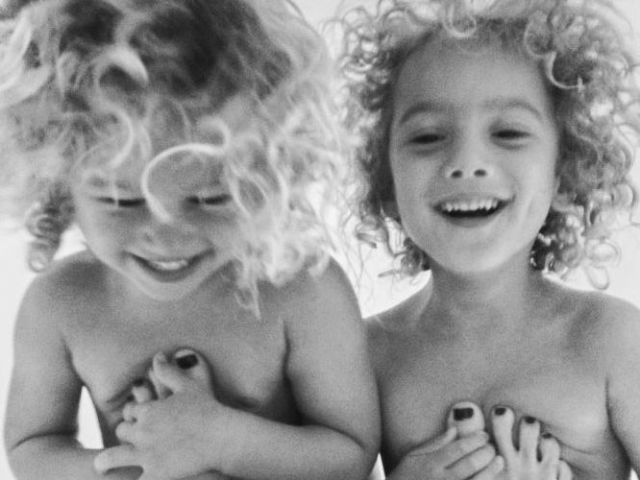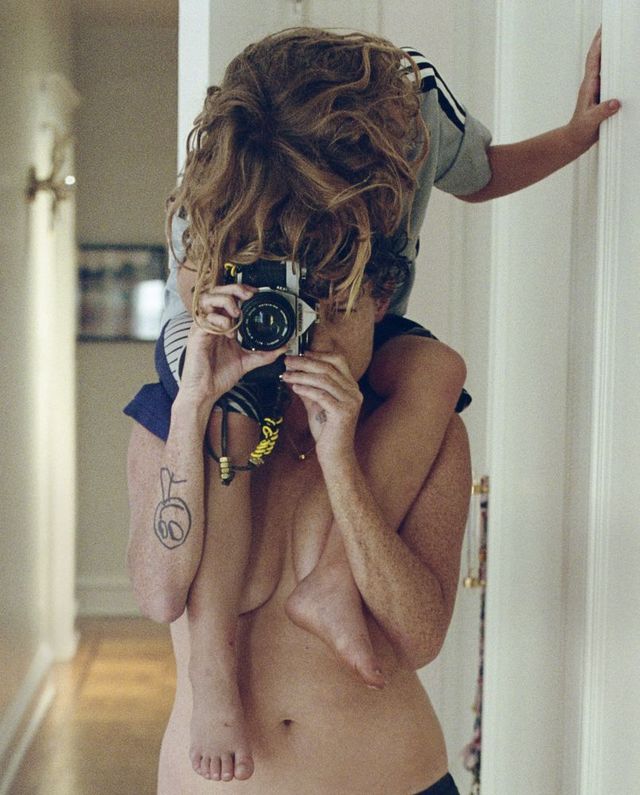The other day, a stranger told me I didn't look like a mum. I was simultaneously flattered and a bit miffed. Flattered because I assume they meant that I look young (I'm 34), sleep nourished and whatever the opposite of harassed is. Miffed because, excuse me, I have two cherubic daughters – can't you tell from my demeanour that I'm a wise, nurturing and achingly cool mum? I wonder what would have made me seem more like a mum. A sensible haircut? A yen for Michael Bublé? A lanyard for my house keys?
Motherhood itself is not a new concept. In fact, it's timeless, universal, and whether you get there by giving birth, adopting or via surrogacy, the job description is the same. And yet our view of what a mum is, how we perceive ourselves as mothers, and the role of motherhood, is complicated and ever-changing. Even my own snap reaction to my apparent un-mumness demonstrates prejudices about what a mother should be.
It can be all too easy to group ourselves into neat little boxes. It's how we organise a confusing world, identify with those around us and assert who we are not. So, you're a 'yummy mummy', a 'slummy mummy', a hipster mum or even, God help us, a 'micro-mummager' (kill me now). The nauseating clichés are endless. And what about your career? And friendships? And sexuality? What happens to these important parts of you when the reality you've known changes forever? Cue mild existential crisis.
It all starts with pregnancy, as you watch your body grow, and become inhabited by another life. When you love fashion and the clothes you wear play a role in your identity, it's difficult having to rethink your style. Yes, there are loads of maternity brands out there, but if you don't want to start wearing embellished Breton tops, you need to get resourceful with your current wardrobe. With a few tweaks and a reliance on black and navy, I managed to look like me, albeit a bit more spherical.
Pregnancy dressing is a walk in the park compared to what comes next, though. I recently returned to work after baby number two, and the question of motherhood and identity has been preoccupying me. Who am I now? What are my priorities? What makes me happy? And how do I align professional ambition with that primitive desire to be near my babies all the time?
When I came back to work after my first daughter, I was still reeling from the shock of new motherhood. I desperately wanted to reclaim the feeling of freedom I felt I'd lost to a year of breastfeeding, overwhelming domesticity and almost no time to myself. So, I threw myself back into my career. I worked harder than ever, socialised more and drank pretty much all the alcohol I'd declined during nine months of pregnancy and the subsequent year of feeding. I started exercising a couple of times a week and genuinely began to feel a little bit more like me with every meeting, spin class and glass of wine. And then, just as I reached the height of my powers again, I (happily) fell pregnant.
So here I am again, after another 12 months of parental leave. Back at work, but horribly conflicted this time round. Time and experience has softened the rash impatience I once felt to claw back my 'old life'. Motherhood doesn't feel as difficult as it once did. I've absorbed the once-terrifying feelings of responsibility, guilt and fear that come with having to care for a whole new life. They've not gone away, they're just a part of me now. And yet I feel emotionally fractured. I want to be at home with my girls and I want to continue pursuing a dynamic and challenging career. At the same time, please. That's a conundrum that no flexible working arrangement can fix.
I can't change the quantum physics to be in two places at once, but I can hopefully go some way to resolving my feelings about it. In her New York Times piece, 'The Birth of a Mother', psychiatrist Dr Alexandra Sacks writes that 'giving birth to a new identity can be as demanding as giving birth to a baby'. Every day, Dr Sacks speaks to women like me who are struggling to reconcile the uncomfortable feeling of this identity split.
When I speak to her over the phone in New York, she identifies it as 'the divided mind' and explains that it's more than just an uneasy feeling – there's science behind it. 'Oxytocin, the chemical in your brain that's released during childbirth and breastfeeding, is the primal evolutionary hormone that tells us to bond,' says Dr Sacks. 'You can't turn that off just because you're on assignment in the office. So, that feeling of never being fully present may also be a reflection of a healthy attachment to your baby.' OK, I feel better already. Thanks, science.
Dr Sacks calls the year after giving birth the 'matrescence'. Like an adolescence, it's an awkward phase of change where you're going through a transition that you essentially just need to ride out. 'You created a human and now you're taking care of your human, so your world is radically different to how it was before. This new responsibility is stressful, and that should be normalised in our culture,' she says. 'Post-natal depression is a real disease, but there are many more women struggling with a normal identity shift that is as awkward in its hormonal and psychological flux as adolescence.'
How do you deal with it? 'You need to be patient with yourself until you can find your new normal.'
Trying to reach back in time to the you before motherhood is a futile exercise. You're mistakenly craving something that doesn't exist any more. The trick is to be calm, patient and allow yourself to adjust to the new reality you are in.
Reality is a word to keep in mind when you're a mum because there's lots of fantasy to contend with. Yes, it's time to talk about social media and the role it plays in this identity stuff. Blake Lively raised this on US talk show Late Night with Seth Meyers during her second pregnancy. 'There's a lady on Instagram who I used to love to watch,' she explained. 'Everything is white and she always has a fresh blueberry pie that's steaming […] and she's reading Old Man and the Sea. Her little baby is just, like, sleeping while she knits, and her toddler is, like, giving her a reflexology massage. [I'm thinking], What?!'
I love Blake Lively.
Like fitness, food and holidays, there is a version of motherhood that exists only in cyberspace that is sent to torture and convince chronically tired mums that there are parents out there whose children sleep on cue and never cry. While Dr Sacks agrees that unattainable images can be unsettling, she rightly points out some of the positives, too, arguing that 'we also want to be able to look at icons who we would like to see ourselves as'. She argues that Beyoncé has done a lot to challenge some of our ideas of what a mother should look like by 'normalising the idea of the fertility goddess, and the space her body is taking up in the world can be beautiful and sexual'.
It goes without saying that wherever Beyoncé leads, I will follow. And Dr Sacks is right. Few of us will ever look like her, but it's great that the images she sends out into the world – and the subsequent gazillion likes and shares – are part of the new story we're telling about motherhood.
ELLE Associate Fashion Editor, Harriet Stewart, on...DRESSING LIKE A MUM
I still don't really feel like a mum. I mean, I am fully aware of the fact I have a child, but I certainly don't feel any different to the way I did before he was born, which (among many other surprising things that came with childbirth) was a complete shock. I'm not quite sure what I expected, but I thought I'd feel different. And perhaps I presumed I would dress differently, too.
I recently realised this as I was sorting through my wardrobe ahead of returning to work, bringing some of my favourite pre-baby clothes out of hibernation and switching my summer clothes for my winter things, lots of which didn't even see the light of day last winter. I was most excited to dig out my black thigh-high boots after a year-long hiatus, but much to my dismay, they were nowhere to be seen. I can only assume I got rid of them in a moment of pregnancy-hormone madness when we moved house. I have some awful recollection of thinking, 'I'll never wear these again, I'm about to become a mother.'
And now here I am: just over a year later and thankfully no longer wearing underwear akin to abseiling gear and draped jersey feeding tops, and searching for a replacement pair of thigh-high boots to wear this winter, livid that I must, at some point, have thought, 'Parents don't wear fuck-me boots.'
If anything, since having a baby, I've wanted to dress up more. This is probably a bid to reconnect with my identity, but it's most likely a reaction against the practicality of my day-to-day mum uniform of jeans, T-shirt and trainers. Some things would look ridiculous for a trip to the sandpit, not to mention totally impractical. And as a result, I've lived in wardrobe basics for the past year, craving the opportunity to wear those boots on a Monday morning.
Prior to returning to work, I wasn't just looking forward to heading back to my job, but also getting dressed up for work. I now wholly appreciate the value in putting on an outfit that makes you feel really good about yourself. That feeling when you put something on and think, 'Yes, today is going to be a good day.'
Writer Nell Frizzell on...BEING EMBRACED BY THE SISTERHOOD
I never joined Brownies. I'm allergic to hen parties, I've never been part of a sports team. But, as my middle thickens with love and my breasts become scored with blue, I have slowly joined a sisterhood.
You would think that after nearly eight months, I'd start to believe that there really is a baby in my body, but not at all. I'm still surprised when soft-eyed women ask me my due date, when fellow swimmers congratulate me for hopping into an unheated pond, or a lady offers me her seat on the train. You could put this down to 'female intuition' if I didn't look like I've swallowed a hoover. Of course they realise I'm pregnant – I'm wearing leggings that come up to my armpits, and have started sitting like Rab C Nesbitt, grunting like a stuck pig when getting up from anything lower than a chair.
I'm well aware that for many new mothers, the company of women can appear at times critical, stifling, red hot with the power of comparison, but I've been lucky in my pregnancy to encounter only a wonderful, reassuring strengthening of sororal relationships. Friends have become confidantes, colleagues have become mentors and my mother is so intimately entwined in my life she now feels like a second skeleton. It is incredible and unexpected to suddenly have this magical key to unlock an intimacy with women who I might have found intimidating, remote, unknown.
As I stand now, I find myself looking to the women around me more than ever. My yoga teacher, school friends, even the women I swim with every week, have become my life belts, gathering around my middle to keep me afloat. Some of them have had children, some of them have not. Some of them had children so long ago that their own babies are now having babies, but just a glance from them down at my girth and a crystal-clear communion springs up between us. They know, they care, they are invested. I love it.
Byrdie.co.uk Editorial Director Amy Lawrenson on...NOT WANTING TO BE A MOTHER
I'm 32 and I don't want children. Never have, and I knew as much from a very young age. Apparently, I'm not alone: according to a recent census, one in five women are now child-free* (either by choice or circumstance).
I have no longing to be pregnant and I don't want my life to be changed by having the responsibility of looking after kids (I can barely time manage myself). Thankfully, my fiancé is in agreement. I'm comfortable with my decision. I own it. When I tell friends, they're often surprised or bemused, but I never take offence. In fact, there have been occasions when women have confided in me about their own longing to go child-free, something some of them are afraid to share with their family or partner.
Those who know me well tell me what a brilliant mother I would be. I am the first to entertain my friends' offspring at gatherings (I wanted to be an actress, they're an easy audience). Kids love me, but I want to be the cool aunt, not the stressed-out mother.
Earlier this year, I went on a yoga retreat and part of the process was to discover our purpose in life, something I haven't found yet (though, let's be honest, who has?). That workshop made me realise that if I'm not going to be a mother, I need to ensure that I use my time on this earth wisely.
So, what will define my life once I'm gone? I know it won't be children. I have no idea what my purpose is. But you know what? That scares me more than the thought of never being a mother.
This article originally appeared in the January issue of ELLE UK.















